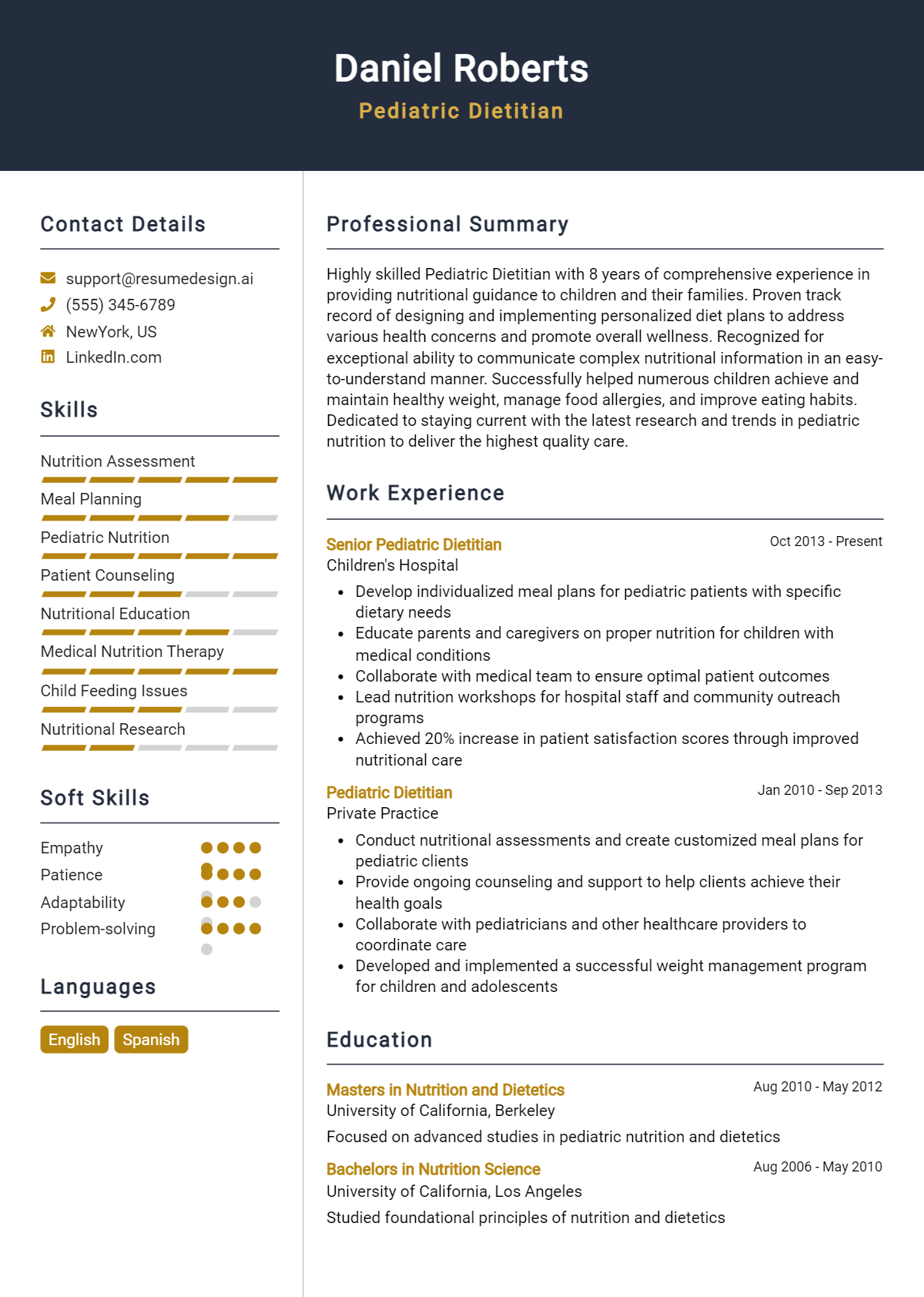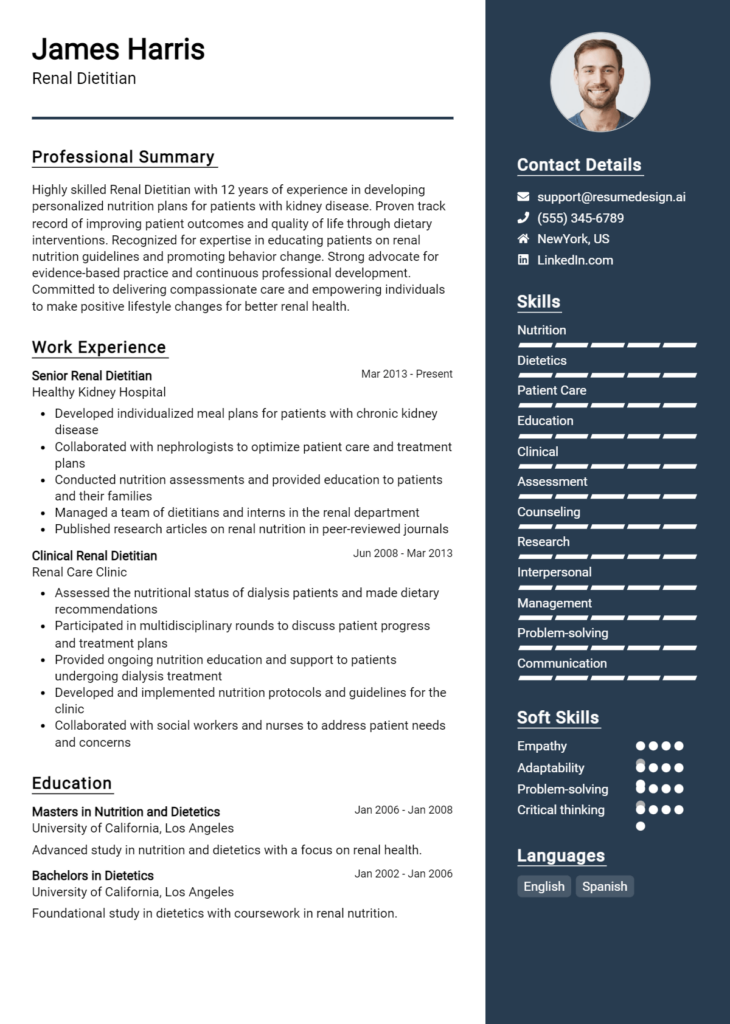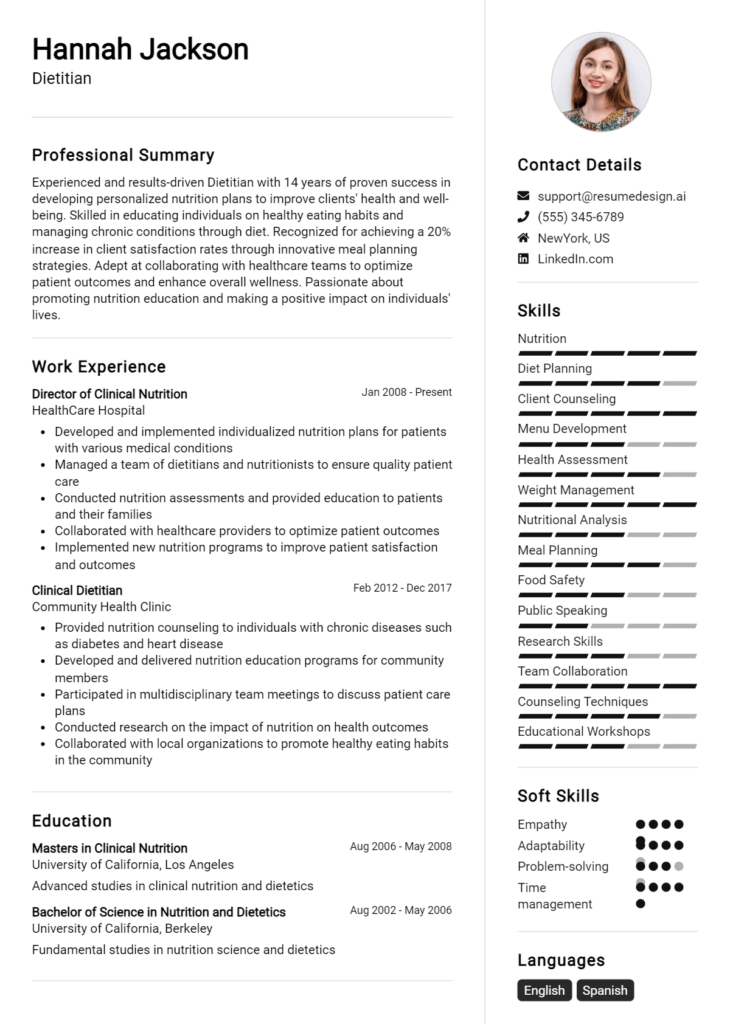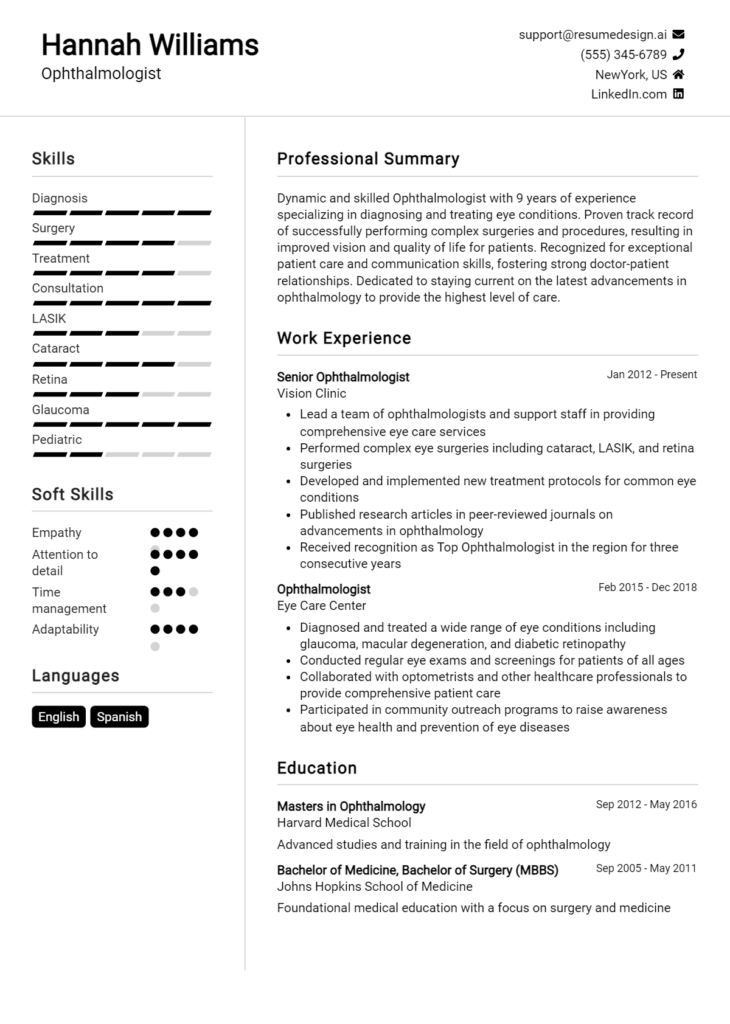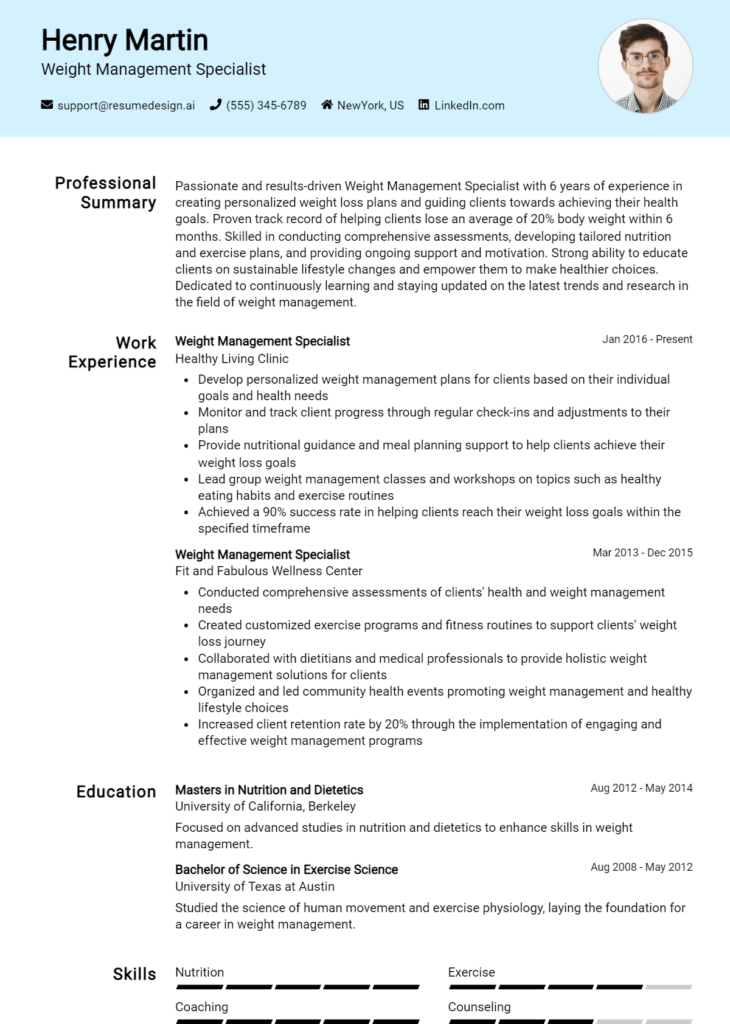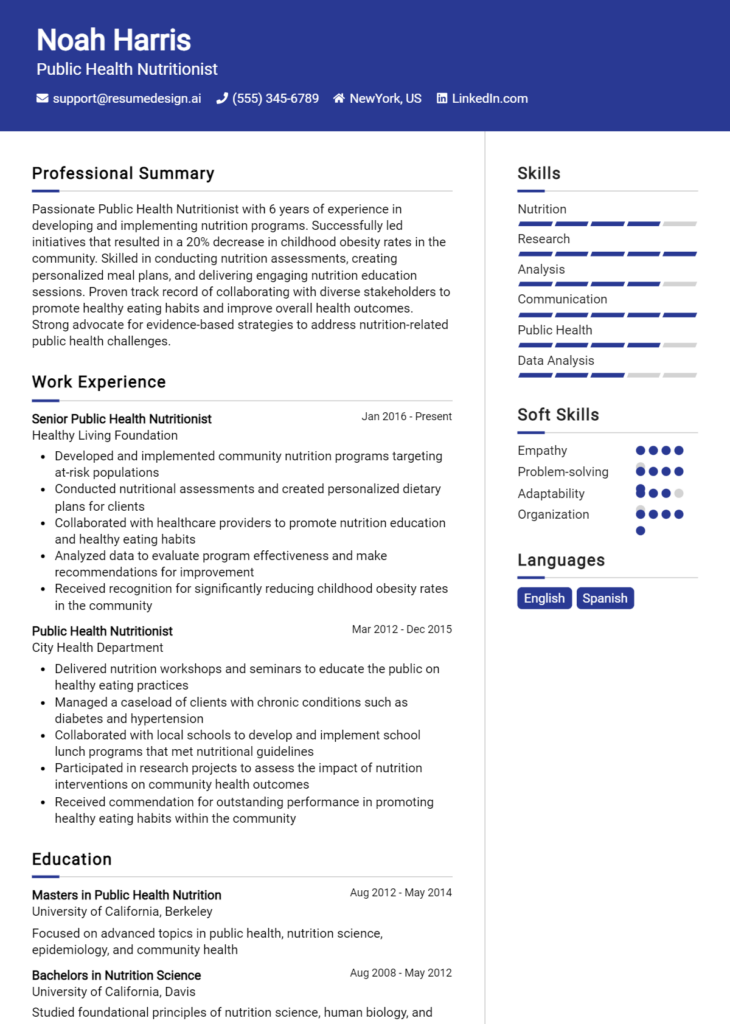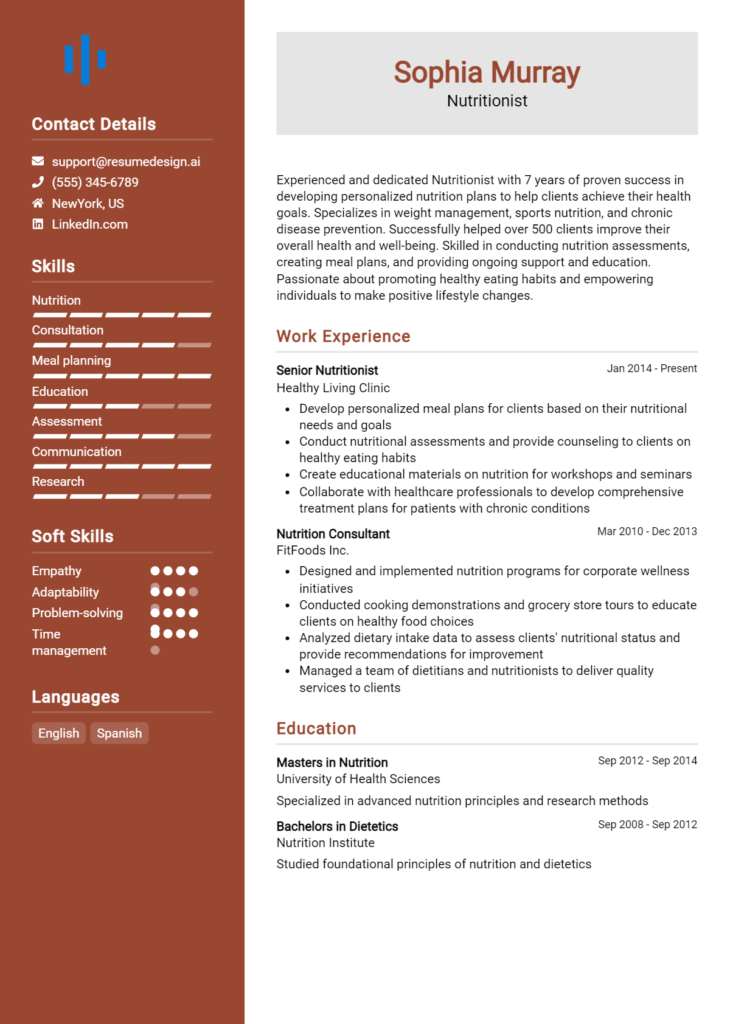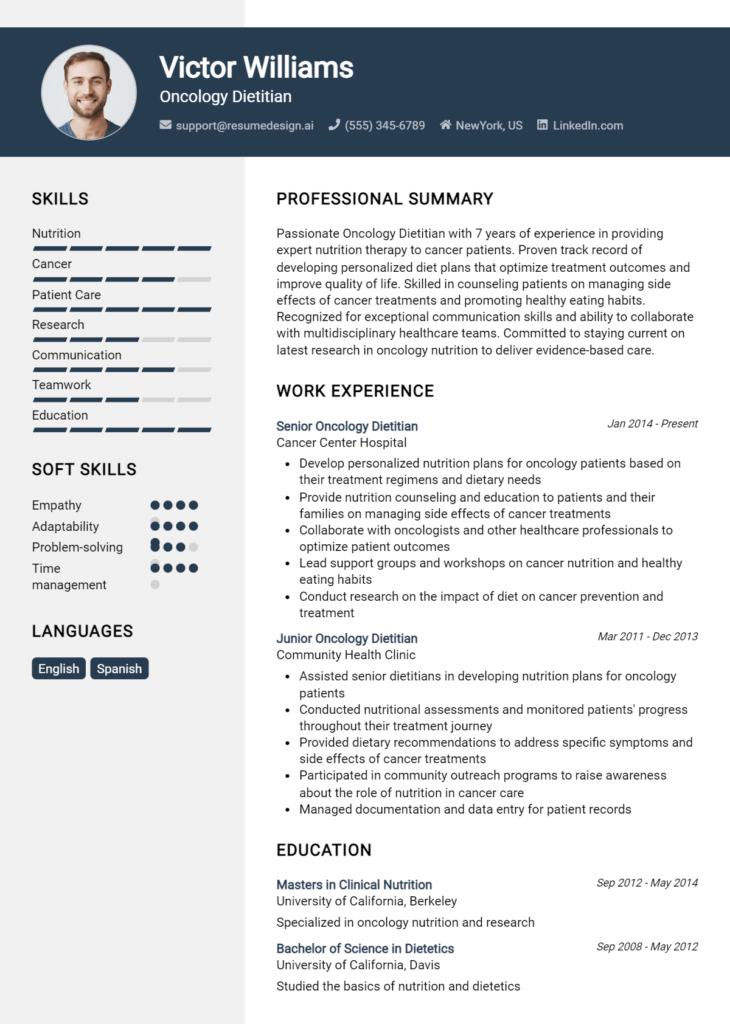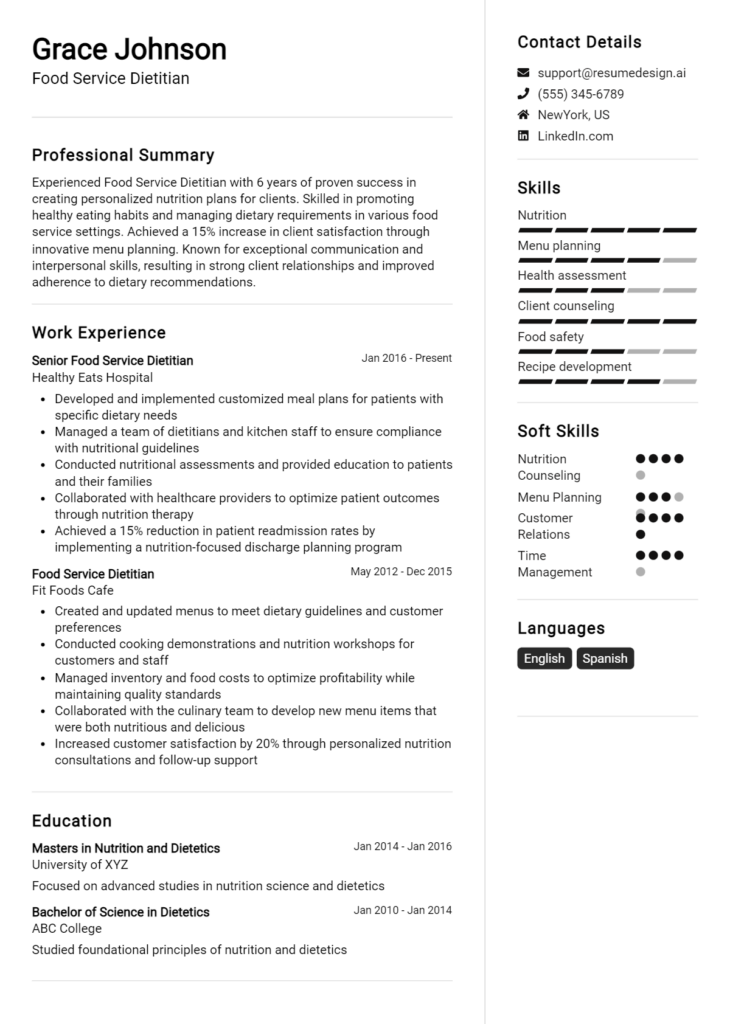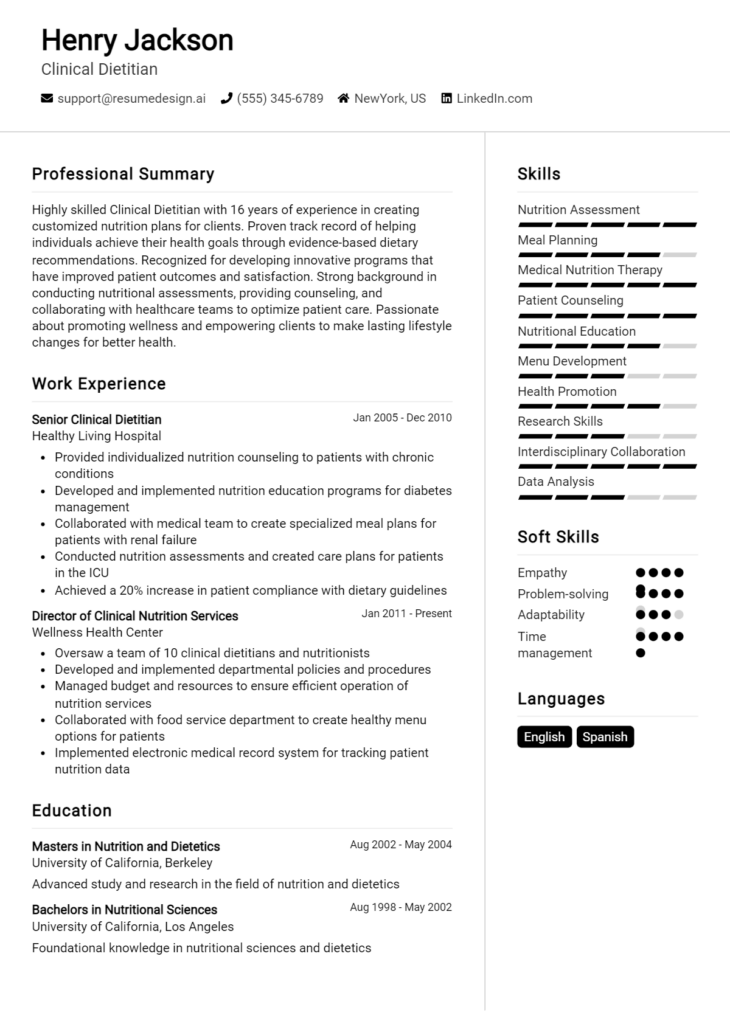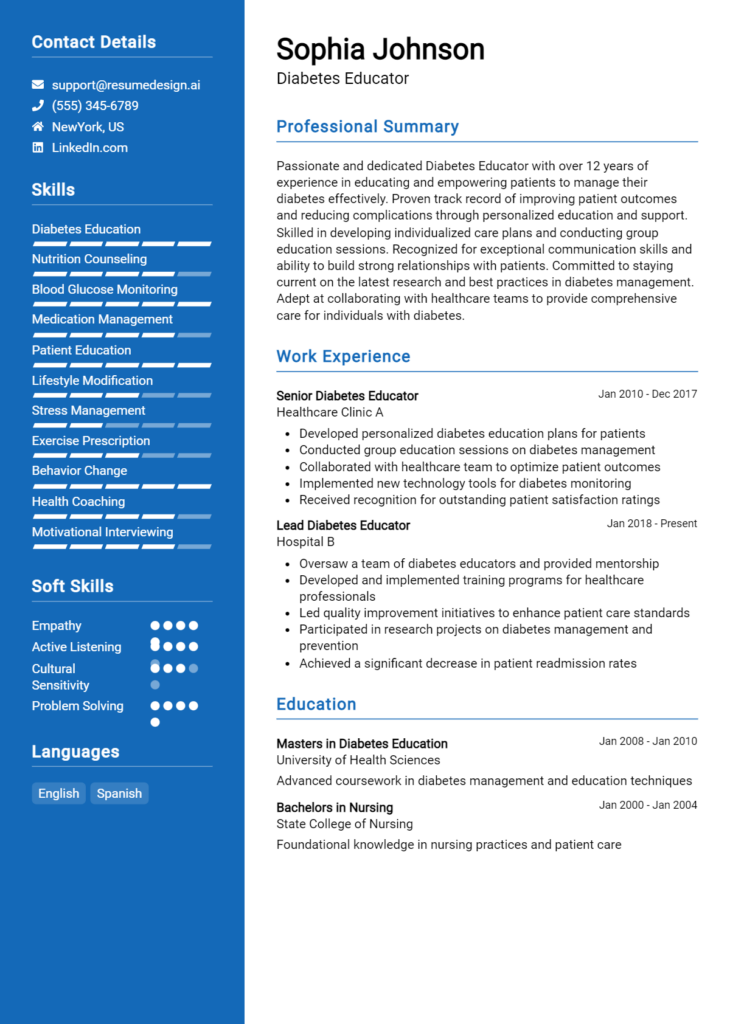Pediatric Dietitian Core Responsibilities
A Pediatric Dietitian plays a crucial role in assessing and providing nutritional guidance to children, ensuring their growth and development needs are met. This position requires strong technical skills in nutrition science, operational abilities to implement dietary plans, and problem-solving skills to address unique challenges faced by young patients. By collaborating with healthcare professionals, such as pediatricians and nurses, the Pediatric Dietitian bridges various departments to enhance patient care. A well-structured resume effectively showcases these competencies, contributing to the organization's overarching goals of promoting children's health and well-being.
Common Responsibilities Listed on Pediatric Dietitian Resume
- Assessing nutritional needs and developing tailored meal plans for children.
- Conducting nutritional education sessions for patients and their families.
- Collaborating with medical staff to devise comprehensive care strategies.
- Monitoring growth and development to ensure dietary adequacy.
- Providing guidance on managing food allergies and intolerances.
- Documenting patient progress and adjusting dietary plans as necessary.
- Staying updated on pediatric nutrition research and guidelines.
- Participating in interdisciplinary team meetings to discuss patient care.
- Creating educational materials on nutrition for children.
- Advocating for healthy eating habits in schools and communities.
- Conducting workshops and seminars on pediatric nutrition.
- Evaluating the effectiveness of dietary interventions and making recommendations.
High-Level Resume Tips for Pediatric Dietitian Professionals
In the competitive field of pediatric nutrition, a well-crafted resume is essential for Pediatric Dietitian professionals. It serves as the first impression a candidate makes on potential employers, acting as a powerful tool to showcase not only their skills and qualifications but also their unique achievements in the field. A standout resume can make the difference between landing an interview or being overlooked. This guide will provide practical and actionable resume tips specifically tailored for Pediatric Dietitian professionals, helping you to effectively communicate your expertise and passion for child nutrition.
Top Resume Tips for Pediatric Dietitian Professionals
- Tailor your resume to the specific job description, highlighting relevant skills and experiences that align with the employer's needs.
- Showcase your clinical experience with children, including internships, volunteer work, or previous positions that emphasize your pediatric nutrition expertise.
- Quantify your achievements where possible, such as the number of patients managed or improvement percentages in dietary outcomes.
- Highlight industry-specific skills, such as knowledge of child growth and development, dietary assessment, and nutritional counseling techniques.
- Include relevant certifications, such as Registered Dietitian Nutritionist (RDN) or Board Certified Specialist in Pediatrics (BCS), to demonstrate your professional qualifications.
- Utilize action verbs to describe your responsibilities and accomplishments, making your resume more dynamic and engaging.
- Incorporate keywords from the job listing to pass through Applicant Tracking Systems (ATS) and increase your chances of being noticed by hiring managers.
- Keep the layout clean and professional, ensuring that it is easy to read and that important information is highlighted effectively.
- Consider adding a summary statement at the top that encapsulates your passion for pediatric nutrition and your career objectives.
By implementing these tips, Pediatric Dietitian professionals can significantly increase their chances of landing a job in this specialized field. A focused and well-organized resume not only highlights your qualifications and achievements but also demonstrates your commitment to making a positive impact on the lives of children through nutrition. With the right approach, your resume can open the door to exciting career opportunities in pediatric dietetics.
Why Resume Headlines & Titles are Important for Pediatric Dietitian
In the competitive field of pediatric nutrition, a well-crafted resume headline or title serves as a critical first impression for candidates applying for the role of Pediatric Dietitian. A strong headline can immediately grab the attention of hiring managers, providing a succinct summary of a candidate's key qualifications and expertise in a single impactful phrase. This essential element should be concise, relevant, and directly related to the job being applied for, allowing potential employers to quickly assess the applicant's fit for the position and encouraging them to delve deeper into the resume.
Best Practices for Crafting Resume Headlines for Pediatric Dietitian
- Keep it concise—aim for a phrase that is no more than 10 words.
- Make it role-specific by including the job title and key skills.
- Highlight unique qualifications or specialized experience in pediatric nutrition.
- Use action verbs or impactful adjectives to convey strength and professionalism.
- Incorporate relevant certifications or areas of expertise.
- Avoid generic phrases; tailor your headline to the specific job description.
- Make it attention-grabbing to stand out in a crowded applicant pool.
- Ensure it aligns with the overall tone and content of your resume.
Example Resume Headlines for Pediatric Dietitian
Strong Resume Headlines
Dedicated Pediatric Dietitian Specializing in Pediatric Obesity Management
Compassionate Pediatric Nutrition Expert with 5+ Years of Clinical Experience
Certified Pediatric Dietitian Committed to Promoting Healthy Eating Habits
Innovative Pediatric Dietitian with Proven Success in Nutritional Counseling
Weak Resume Headlines
Dietitian Looking for a Job
Nutrition Professional
Experienced in Food and Nutrition
The strong headlines are effective because they clearly articulate the candidate's specialized skills, relevant experience, and commitment to pediatric nutrition, making them immediately appealing to hiring managers. In contrast, the weak headlines fail to impress due to their vagueness and lack of specificity, providing no insight into the candidate's qualifications or unique offerings, which can lead to them being overlooked in favor of more compelling applicants.
Writing an Exceptional Pediatric Dietitian Resume Summary
A resume summary is a critical component for a Pediatric Dietitian, serving as the first impression for hiring managers. This brief yet powerful statement encapsulates a candidate's key skills, experiences, and accomplishments that are directly relevant to the role. A well-crafted summary can quickly capture attention, making it easier for decision-makers to see the candidate's potential fit within their organization. It should be concise, impactful, and tailored to the specific job at hand, effectively showcasing why the candidate is the ideal choice for the position.
Best Practices for Writing a Pediatric Dietitian Resume Summary
- Quantify Achievements: Use numbers to highlight your successes, such as the percentage of improved patient outcomes.
- Focus on Relevant Skills: Highlight specific skills that are essential for the role, such as knowledge in pediatric nutrition, counseling, and meal planning.
- Tailor to the Job Description: Customize your summary to align with the requirements and responsibilities listed in the job posting.
- Be Concise: Keep your summary to 2-4 sentences to ensure it is easily digestible.
- Use Action Verbs: Start sentences with strong action verbs to convey confidence and proactivity.
- Showcase Professional Development: Mention any relevant certifications or ongoing education that enhances your qualifications.
- Highlight Team Collaboration: Emphasize your experience working with healthcare teams to provide holistic care.
- Include Personal Passion: Briefly mention your commitment to improving child health and nutrition to convey your dedication to the field.
Example Pediatric Dietitian Resume Summaries
Strong Resume Summaries
Dedicated Pediatric Dietitian with over 5 years of experience in developing tailored nutrition plans for children, resulting in a 30% improvement in client health outcomes. Proficient in collaborating with multidisciplinary teams to create comprehensive dietary strategies that promote optimal growth and development.
Results-driven Pediatric Dietitian with expertise in managing dietary requirements for children with special needs. Successfully implemented nutrition education programs that improved knowledge retention by 40% among families, fostering healthier eating habits.
Compassionate Pediatric Dietitian with a strong background in clinical nutrition and a specialty in food allergies. Developed and executed individualized meal plans for over 200 pediatric patients, achieving a 25% reduction in allergy-related incidents among clients.
Weak Resume Summaries
Pediatric Dietitian with some experience in the field. I am passionate about nutrition and helping children.
Experienced nutritionist looking for a job in pediatric dietetics. I have worked with kids and understand their dietary needs.
The strong resume summaries are considered effective because they provide specific, quantifiable achievements and relevant skills that directly relate to the role of a Pediatric Dietitian. They illustrate the candidate's impact and expertise, making a compelling case for their candidacy. In contrast, the weak summaries lack specificity and measurable outcomes, making them appear generic and less impactful. They do not effectively convey the candidate's qualifications or unique contributions to the field.
Work Experience Section for Pediatric Dietitian Resume
The work experience section of a Pediatric Dietitian resume is critical as it serves as a platform to demonstrate the candidate's technical skills, leadership abilities, and commitment to delivering high-quality dietary solutions tailored for children. This section allows potential employers to gauge the candidate's hands-on experience in managing dietary programs, collaborating with healthcare teams, and implementing evidence-based practices. By quantifying achievements and aligning their experience with industry standards, candidates can effectively showcase their value and readiness to contribute to a pediatric healthcare setting.
Best Practices for Pediatric Dietitian Work Experience
- Use specific metrics to quantify achievements, such as percentage improvements in patient outcomes or number of successful dietary plans implemented.
- Highlight technical skills, including proficiency in nutritional analysis software and knowledge of pediatric dietary needs.
- Emphasize teamwork by detailing collaborative projects with other healthcare professionals, such as physicians and nurses.
- Detail leadership roles, including managing interns or leading dietary workshops for families and staff.
- Incorporate relevant certifications and training that enhance your expertise in pediatric nutrition.
- Showcase adaptability by mentioning experiences in various healthcare settings, such as hospitals, outpatient clinics, or community health programs.
- Tailor your experiences to reflect the specific job requirements outlined in the job description.
- Use action verbs that convey proactivity and results-driven approaches, such as "developed," "implemented," or "coordinated."
Example Work Experiences for Pediatric Dietitian
Strong Experiences
- Developed and implemented a comprehensive nutrition program that improved dietary adherence among pediatric patients by 30% over six months.
- Led a multidisciplinary team to create a pediatric obesity prevention initiative, resulting in a 25% decrease in BMI among participants over one year.
- Conducted over 200 successful nutrition consultations, directly contributing to enhanced health outcomes for children with chronic illnesses.
- Managed a team of dietetics interns, providing mentorship that led to a 100% pass rate on the national registration exam for interns under my supervision.
Weak Experiences
- Worked with children on nutrition plans.
- Helped in various dietary programs.
- Participated in nutritional assessments occasionally.
- Assisted in managing a dietitian's office.
The strong experiences are considered effective because they provide specific, quantifiable outcomes and demonstrate leadership, collaboration, and technical expertise in pediatric nutrition. In contrast, the weak experiences lack detail and fail to convey impactful results or the candidate's active role in their work, making them less compelling to potential employers.
Education and Certifications Section for Pediatric Dietitian Resume
The education and certifications section of a Pediatric Dietitian resume is crucial as it showcases the candidate's academic background and demonstrates their commitment to professional development in the field of pediatric nutrition. This section not only highlights relevant degrees and specialized training but also emphasizes industry-relevant certifications that validate the candidate's expertise. By providing information on relevant coursework and continuous learning efforts, candidates can enhance their credibility and better align themselves with the specific requirements of the Pediatric Dietitian role, making a strong impression on potential employers.
Best Practices for Pediatric Dietitian Education and Certifications
- Include relevant degrees such as a Bachelor's or Master's in Dietetics, Nutrition, or a related field.
- Highlight certifications from recognized organizations, such as the Certified Pediatric Nutrition Specialist (CNSC) or Registered Dietitian Nutritionist (RDN).
- Detail any specialized training programs or workshops attended that pertain to pediatric nutrition.
- Provide relevant coursework that demonstrates knowledge in areas like child development, food allergies, and nutrition assessment.
- List any continuing education credits or professional development courses completed in pediatric nutrition.
- Be specific about the date of graduation and completion of certifications to indicate current qualifications.
- Show any memberships in professional organizations related to pediatric nutrition, such as the Academy of Nutrition and Dietetics.
- Keep the format consistent and easy to read to ensure key information stands out.
Example Education and Certifications for Pediatric Dietitian
Strong Examples
- Bachelor of Science in Dietetics, University of Health Sciences, 2020
- Certified Pediatric Nutrition Specialist (CNSC), 2021
- Master of Science in Nutrition with a focus on Pediatric Dietetics, University of Wellness, 2022
- Completed coursework in Pediatric Nutrition and Feeding Disorders, 2020
Weak Examples
- Bachelor of Arts in English Literature, University of Language, 2015
- Certification in General Nutrition (expired in 2019)
- Online course in Cooking Techniques, not related to pediatric nutrition, 2021
- High School Diploma, 2010
The strong examples are considered relevant and impactful because they directly align with the qualifications needed for a Pediatric Dietitian, showcasing both academic credentials and specialized certifications that enhance the candidate's suitability for the role. In contrast, the weak examples reflect outdated or irrelevant qualifications that do not contribute to the candidate's expertise in pediatric nutrition, potentially diminishing their appeal to employers seeking qualified professionals in this specialized field.
Top Skills & Keywords for Pediatric Dietitian Resume
A well-crafted resume for a Pediatric Dietitian not only highlights professional achievements but also emphasizes essential skills that set candidates apart in this specialized field. Skills are critical in demonstrating the ability to assess, plan, and implement nutritional strategies tailored to the unique needs of children. These skills reflect a combination of clinical knowledge, communication prowess, and a deep understanding of pediatric nutrition, making them vital for any aspiring Pediatric Dietitian. A strong resume should showcase both hard and soft skills, allowing potential employers to see the candidate's full range of competencies and their potential impact on patient care.
Top Hard & Soft Skills for Pediatric Dietitian
Soft Skills
- Empathy and Compassion
- Effective Communication
- Active Listening
- Team Collaboration
- Problem-Solving
- Adaptability
- Patience
- Attention to Detail
- Cultural Competence
- Motivational Skills
- Time Management
- Organization
- Critical Thinking
- Conflict Resolution
- Leadership Skills
- Educational Skills
- Advocacy Skills
Hard Skills
- Nutritional Assessment
- Pediatric Nutrition Knowledge
- Dietary Planning
- Clinical Research
- Knowledge of Food Allergies
- Familiarity with Dietary Supplements
- Medical Nutrition Therapy (MNT)
- Understanding of Growth Charts and Developmental Milestones
- Food Safety Standards
- Software Proficiency (e.g., nutrition analysis software)
- Data Analysis Skills
- Public Speaking
- Knowledge of Pediatric Diseases and Conditions
- Recipe Development
- Nutrition Education Techniques
- Familiarity with Regulatory Guidelines
- Ability to Conduct Workshops and Presentations
By integrating these skills into a resume, candidates can effectively showcase their qualifications and experiences, making a strong case for their potential contributions to a healthcare team. For further insight into how to enhance your resume, visit our pages on skills and work experience.
Stand Out with a Winning Pediatric Dietitian Cover Letter
Dear [Hiring Manager's Name],
I am writing to express my enthusiasm for the Pediatric Dietitian position at [Company Name] as advertised on [where you found the job posting]. With a Master’s degree in Nutrition and Dietetics, along with over [X years] of experience working with children in both clinical and community settings, I am excited about the opportunity to contribute to your team. My passion for promoting healthy eating habits among children, combined with my expertise in developing tailored nutrition plans, makes me a strong candidate for this role.
During my tenure at [Previous Employer], I successfully collaborated with healthcare professionals to create individualized dietary programs for children with various health conditions, including obesity, diabetes, and food allergies. My experience in conducting comprehensive assessments and working closely with families has reinforced my belief in the importance of education and support in fostering long-term healthy habits. I am adept at using evidence-based practices to educate both children and their caregivers about nutrition, making complex concepts accessible and engaging.
I am particularly drawn to [Company Name] because of its commitment to holistic pediatric care and community outreach programs. I admire your innovative approach to integrating nutrition into overall health strategies for children. I am eager to bring my skills in nutrition education, menu planning, and interdisciplinary collaboration to your esteemed team. I am confident in my ability to make a positive impact on the health and well-being of the children and families you serve.
Thank you for considering my application. I look forward to the opportunity to discuss how my background, skills, and enthusiasms align with the goals of [Company Name]. I hope to contribute to your mission of promoting healthier lifestyles for children and families in our community.
Warmest regards,
[Your Name]
[Your Phone Number]
[Your Email Address]
[Your LinkedIn Profile or Professional Website]
Common Mistakes to Avoid in a Pediatric Dietitian Resume
When crafting a resume as a Pediatric Dietitian, it's crucial to present your skills and experiences effectively to stand out in a competitive job market. However, many candidates make common mistakes that can hinder their chances of landing an interview. By avoiding these pitfalls, you can create a compelling resume that highlights your qualifications and passion for pediatric nutrition.
Neglecting to Tailor the Resume: A generic resume that doesn’t align with the specific job description can make you appear uninterested. Customizing your resume to match the requirements of each position shows your attention to detail and commitment to the role.
Overloading with Jargon: While it's important to demonstrate your expertise, using excessive technical jargon can alienate hiring managers who may not be familiar with specialized terms. Aim for a balance that showcases your knowledge while remaining accessible.
Lack of Quantifiable Achievements: Failing to include measurable accomplishments can make your experience seem vague. Use specific numbers or outcomes, such as improved patient health metrics or successful program implementations, to illustrate your impact.
Ignoring Soft Skills: Pediatric dietitians require strong interpersonal skills to communicate with children and their families effectively. Omitting these qualities in your resume can create an incomplete picture of your capabilities.
Poor Formatting: A cluttered or difficult-to-read resume can detract from your qualifications. Use clear headings, bullet points, and a clean layout to improve readability and ensure that key information stands out.
Excessive Length: A resume that is too long can overwhelm hiring managers. Aim for a concise format, ideally one page, to highlight only the most relevant experiences and skills.
Failing to Include Continuing Education: The field of pediatric nutrition is constantly evolving. Not mentioning relevant certifications, workshops, or ongoing education makes it seem like you are not committed to professional growth.
Omitting a Professional Summary: A resume without a strong summary at the top can miss the opportunity to make a positive first impression. A concise summary that encapsulates your experience and passion for pediatric dietetics can set the tone for the rest of your resume.
Conclusion
As we conclude our discussion on the vital role of a Pediatric Dietitian, it's important to recognize the impact these professionals have on the health and well-being of children. From developing tailored nutrition plans to educating families about healthy eating habits, Pediatric Dietitians are essential in promoting lifelong wellness in young patients.
A well-crafted resume is crucial for standing out in this competitive field. Ensure that your resume highlights your relevant experience, education, and specialized skills in pediatric nutrition.
Now is the perfect time to review and update your Pediatric Dietitian resume. Take advantage of the available resources to create a compelling application. Explore resume templates to find a design that suits your style, use the resume builder for a user-friendly approach to crafting your resume, and check out resume examples for inspiration. Additionally, don’t forget to enhance your application with a strong cover letter using our cover letter templates.
Start today by refining your resume to better reflect your qualifications and commitment to the field of pediatric nutrition!

